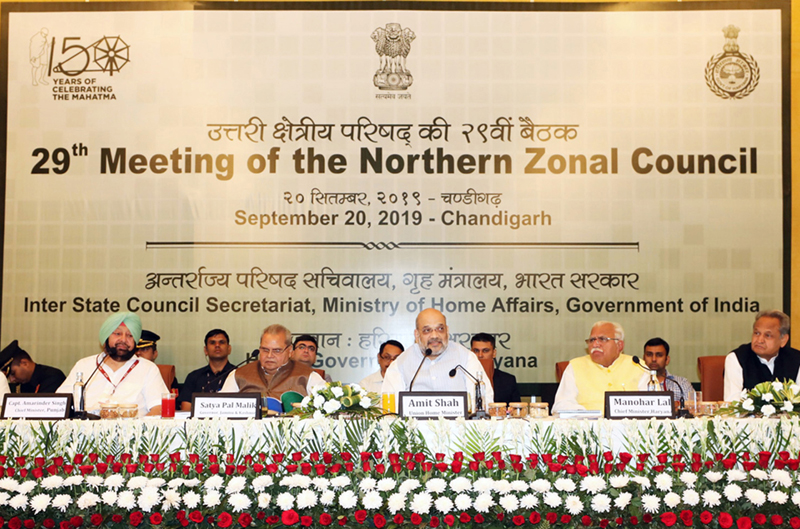
Shah chairs NZC meeting, Guv represents J&K
Many issues amicably resolved, says HM
Sanjeev Pargal
JAMMU, Sept 20: Security and boundary related issues figured prominently in the North Zone Council (NZC) meeting held in Chandigarh today presided over by Union Home Minister Amit Shah and attended among others by Jammu and Kashmir Governor Satya Pal Malik.
Punjab Chief Minister Capt Amarinder Singh, Haryana Chief Minister Manohar Lal Khattar, Rajasthan Chief Minister Ashok Gehlot, Himachal Chief Minister Jai Ram Thakur, Delhi Lieutenant Governor Anil Baijal and Chandigarh Administrator V P Singh Badnore were present.
“Chaired the 29th North Zone Council meeting at Chandigarh. Had extensive discussions and many inter-State issues were amicably resolved,” Shah tweeted after the 29th meeting of the NZC.
Sources told the Excelsior that security related issues of the States figured prominently in the meeting apart from boundary-related disputes, infrastructure issues like construction of roads, National Highways, setting up of industries and power plants and boosting inter-State transport connectivity.
Tourism promotion was another issue which was raised by almost all the member States including Jammu and Kashmir, Punjab, Haryana, Himachal Pradesh, Rajasthan and New Delhi, who wanted the Centre to come up in a big way in promotion of tourism across the country, as it was mainstay of economy in Jammu and Kashmir, Himachal Pradesh, Punjab etc.
They also wanted religious tourism to be promoted in these States which will attract the people to Northern India further. Already religious tourism attracts lakhs of people daily in Jammu, Punjab, Himachal Pradesh and Rajasthan.
“Some of the States wanted inter-State connectivity to be further enhanced with construction of roads and National Highways,” sources said, adding that security was one of the aspects which figured at the meeting prominently.
Few days back a truck had taken off from Azadpur Sabzi Mandi in New Delhi and was heading towards Pulwama in South Kashmir when it was intercepted at Lakhanpur, the gateway to Jammu and Kashmir, bordering Punjab, from which three Jaish-e-Mohammed (JeM) militants were arrested along with six assault rifles and ammunition concealed in empty apple cartons.
The consignment of weapon had been loaded in the truck from New Delhi and it had crossed several check posts and nakas before being intercepted at Lakhanpur.
Sources said the States stressed for better coordination, Intelligence and other information sharing to keep law and order situation well under control.
Chief Minister of Haryana Manohar Lal Khattar, who is also Vice-Chairman of the Council, hosted the meeting.
Chief Ministers from the member States in the zone along with two ministers each, administrators of Union Territories, Chief Secretaries and senior officers from the State Governments and the Central Government are members of NZC.
The Council takes up issues involving Centre and States. The Zonal Councils thus provide a forum for resolving disputes and irritants between Centre and States and among many States in the Zone.
The Zonal Councils discuss a broad range of issues which include boundary-related disputes, security, infrastructure-related matters like road, transport, industries, water, power, matters pertaining to forests and environment, housing, education, food security, tourism, transport, etc.
Five Zonal Councils were set up in the year 1957 under the States Reorganization Act, 1956. The Union Home Minister is the Chairman of each of these five Zonal Councils and Chief Ministers of the host State (to be chosen by routine every year) is the Vice-Chairman. Two more Ministers from each State are nominated as Members by the Governor.
Some of the States including Punjab which was represented by Chief Minister Amarinder Singh strongly raised the menace of drugs in some of the Northern Indian States and called upon the Central Government to come out with firm ‘National Drug Policy’. While the States were doing their job, Punjab wanted full cooperation of the Central Government especially the Ministry of Home Affairs in tackling the menace.
Some other States, sources said, raised the issue of losses suffered by them after the implementation of Goods and Services Tax (GST) and wanted the Central Government to compensate them.
While there was no official statement from the Ministry of Home Affairs, sources said Home Minister Amit Shah was reported to have assured the participating Governors and Chief Ministers of Northern States that all the issues raised by them will be taken care of.

